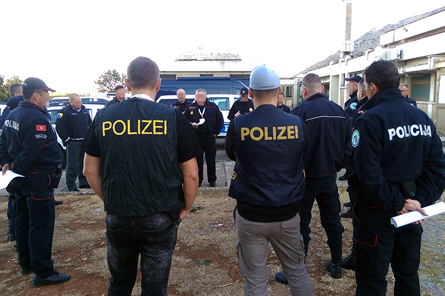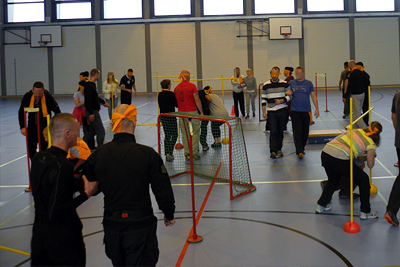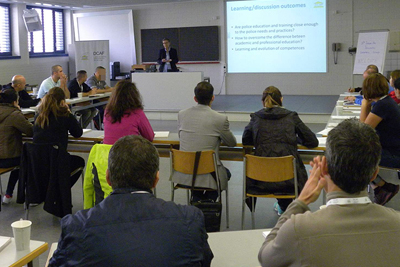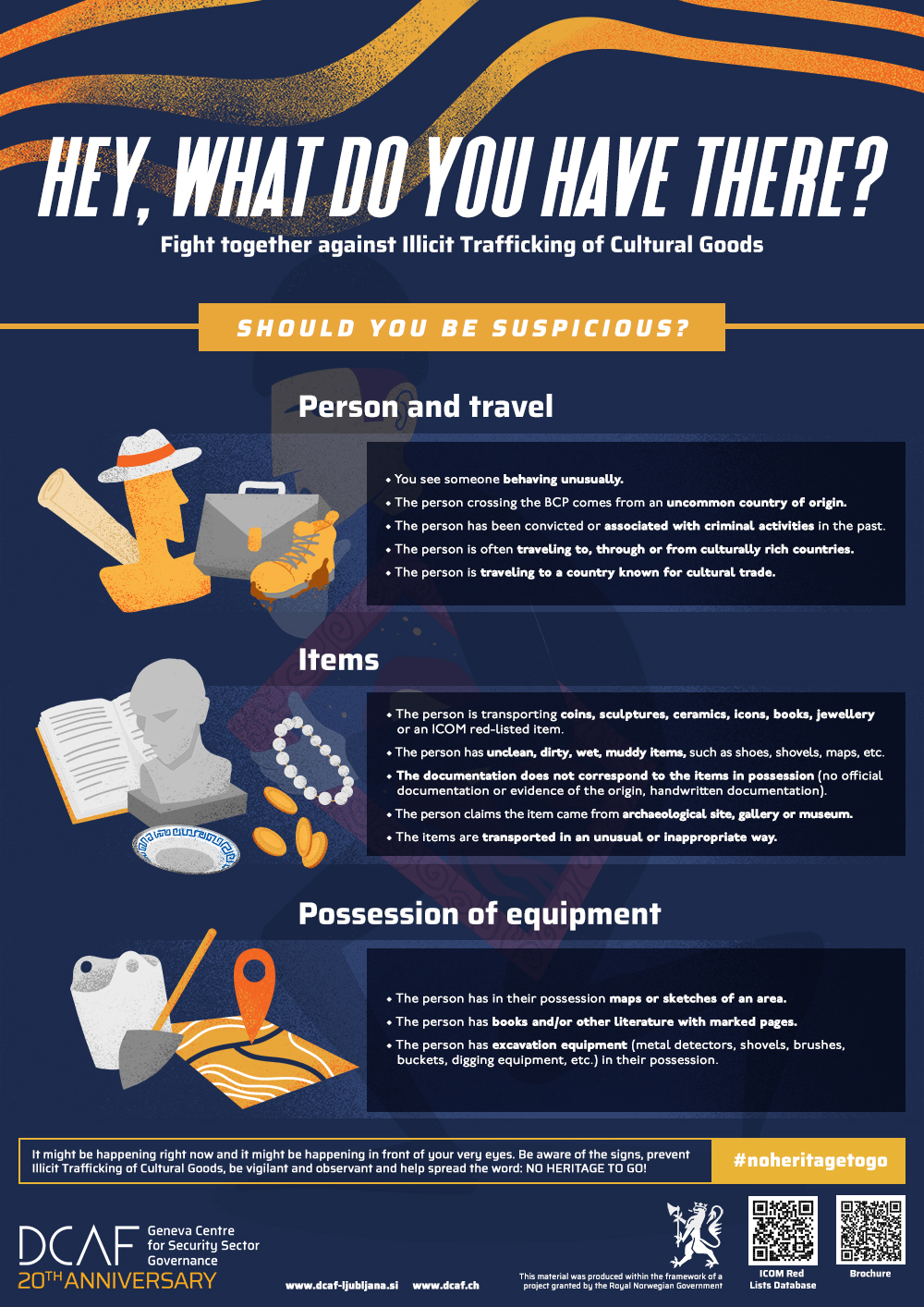Border Security
Following the heightened security situation in the Western Balkan Region in the 1990s the DCAF Border Security Programme in the Western Balkans (BSP) was established to promote regional stability and support cooperation focused on prosperous EU integration.
Through its continued engagement since 2002, the programme has significantly contributed to the first steps toward professionalization of services and their alignment with European standards. It contributes to raising of efficiency of border management authorities in Southeast Europe and fosters mutual cooperation to successfully mitigate modern and occurring security threats to regional and European border integrity.
Workstreams/Projects
(1) Operational cooperation in the fight against organised and cross-border crime,
(2) Police education and training, and
(3) Introduction of European/Schengen legislative and practical standards in border policing.
DCAF assists the Beneficiary countries (Albania, Bosnia and Herzegovina, Moldova, Montenegro, North Macedonia and Serbia) in enhancing regional operational cooperation through a wide variety of actions, among others through facilitation of regional cross-border operational police measures (“Common” and “Coordinated” operations) at regional borders, aimed to mitigate security risks posed to the Western Balkan borders.
Together with the beneficiaries we work on development of a yearly risk analysis, analysing key border security developments, and identifying trends in cross-border criminality. The regional risk analysis follows a principle of intelligence-led policing and presents a basis for operational planning and engagement.
The Border Security Programme is flexible in its approach to addressing the acute security threats and provides the Beneficiaries with support through a tailored operational response. At the same time, it also addresses the capacity building aspect through dedicated trainings on key elements of countering serious and organised crime.
 While the peer-to-peer training through field operational activities has helped the countries to improve their capacities for combating organised crime (e.g., training on cultural mediation, training on debriefing procedures, training on criminal intelligence gathering…) the operational engagement also provides other regional players, such as Frontex and Europol, with valuable insight on the key challenges in the Region, and sets the groundwork for subsequent operations.
While the peer-to-peer training through field operational activities has helped the countries to improve their capacities for combating organised crime (e.g., training on cultural mediation, training on debriefing procedures, training on criminal intelligence gathering…) the operational engagement also provides other regional players, such as Frontex and Europol, with valuable insight on the key challenges in the Region, and sets the groundwork for subsequent operations.
DCAF works with the Beneficiaries in areas related to education and training, contributing to improvement of competences of police officers, promotion of the exchange of know-what and know-how, strengthening professional ties and mutual assistance, and adding value individual organisations responsible for law enforcement education and training.
We work together with its Beneficiaries and partner organisations and organise thematic learning events, based on the recognised need and identified gaps in daily work of relevant law enforcement agencies, pursuing stronger cooperation through common learning. Tailored trainings, Train-the-trainers trainings, curriculum development, development of learning material and publication, etc. all constitute the work within this strand of activities.
For years, DCAF has partnered with the Mountaineering services of the Swiss military, to deliver its Europe-wide famous Summer train-the-trainers training course in Andermatt, Switzerland, has cooperated with CEPOL to develop learning modules on specific tools of cross-border police cooperation, has designed table-top and in-person exercises and simulations, offered support in development of curricula on different topics and helped train the staff of police academies and other law enforcement educational institutions from the Western Balkan region.
The Border Security Programme has access to a wide array of education and training specialist, specific subject-matter experts and has a proven record of successfully responding to the practical needs of border police services.


Photos: DCAF

DCAF facilitates the introduction of European legislative standards and best practices in border policing to Western Balkan police services in view of the responsibilities of their future EU/Schengen membership.
The preparation of Beneficiary Western Balkan states and Moldova for the EU/Schengen Integration and improving their readiness to undertake responsibilities arising from the EU and consequently the Schengen membership status, is one of the priorities of the DCAF Border Security Programme’s framework - Schengen Integration Task Force.
As Schengen integration remains the main prerogative for the Southeast Europe or Southeastern Europe countries, the DCAF Schengen Task Force continues to provide specific assistance to border police authorities and experts from the ministries of interior/security during the process of the preparations and undertaking the responsibilities arising from eventual full EU membership/eventual full Schengen integration, especially under the overarching process of fulfilling conditions under EU Accession Chapter 24.
The general objectives of the implementation process will provide a good understanding of the current state-of-play in the area of border security, anticipation of the possible developments, enable the development of intelligence-led policing in the regional framework, common planning, strategic, operational and tactical decision-making, and mutually coordinated Schengen integration in order to assist beneficiary states to apply the Schengen acquis correctly and efficiently.
Photos: DCAF
 DCAF Border Security Programme responds to the needs of its Beneficiaries and provides ad hoc support and solutions to the needs of its Beneficiaries to new and emerging security threats and developments. With a flexible approach, the know-how on how to tackle even the toughest challenges, we work with our counterparts to develop tailored solutions, deliver knowledge products and implement project that contribute to the enhanced capacities of the border security services of our Beneficiaries.
DCAF Border Security Programme responds to the needs of its Beneficiaries and provides ad hoc support and solutions to the needs of its Beneficiaries to new and emerging security threats and developments. With a flexible approach, the know-how on how to tackle even the toughest challenges, we work with our counterparts to develop tailored solutions, deliver knowledge products and implement project that contribute to the enhanced capacities of the border security services of our Beneficiaries.
In the past, we have provided dedicated training and awareness-raising missions in the area of combating illicit trafficking of cultural goods. We have developed training courses on prevention and countering violent extremism, training modules on tools for cross-border cooperation, prepared tailed exercises and simulations on crisis management, prepared standard operating procedures for law enforcement in pandemic-type situations, offered expert support in development of national strategies in the area of migration management, provided guidance in the and expertise in the area of criminal intelligence, etc.
PUBLICATIONS
Contacts
Rok Derenčin, Head of DCAF Border Security Programme (r.derencin@dcaf.ch)

